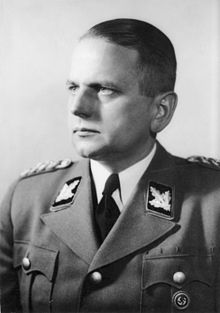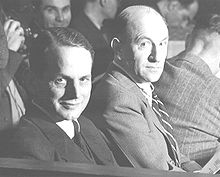- Otto Ohlendorf
-
Otto Ohlendorf 
SS-Brigadeführer Otto OhlendorfBorn 4 February 1907
Hoheneggelsen, Kingdom of Prussia, German EmpireDied 8 June 1951 (aged 44)
Landsberg am Lech, BavariaAllegiance  Nazi Germany
Nazi GermanyService/branch  Waffen-SS
Waffen-SSYears of service 1925 — 1945 Rank SS-Gruppenführer und Generalleutnant der Polizei Commands held Einsatzgruppe D
Amt III, RSHABattles/wars World War II Awards War Merit Cross I class Otto Ohlendorf (4 February 1907 – 8 June 1951) was a German SS-Gruppenführer and head of the Inland-SD (responsible for intelligence and security within Germany), a section of the SD. Ohlendorf was the commanding officer of Einsatzgruppe D, which conducted mass murder in Moldova, south Ukraine, the Crimea, and, during 1942, the north Caucasus. As such, Otto Ohlendorf was a Holocaust perpetrator and mass murderer. He was convicted of and executed for war crimes committed during World War II.
Contents
Biography
Early life
Born in Hoheneggelsen (part of Söhlde; then in the Kingdom of Prussia), the son of farm owners, he joined the Nazi Party in 1925 (member 6631) and the SS (member #880) in 1926. Ohlendorf studied economics and law at the University of Leipzig and the University of Göttingen, and by 1930 was already giving lectures at several economic institutions.
Third Reich
In early 1936, he became an economic consultant to the SD, attached to the SS with the rank of SS-Hauptsturmführer. In May 1936, he was promoted to SS-Sturmbannführer and took a senior post. In 1939, he was once again promoted to SS-Standartenführer and appointed as head of Amt III Inland-SD, of the Reichssicherheitshauptamt, a position he kept until 1945. In addition, from 1943 onwards, Ohlendorf was appointed as deputy director general of the Reich Ministry of Economic Affairs, and promoted once more in 1944 to Gruppenführer.
In June 1941, Reinhard Heydrich appointed Ohlendorf to be commander of Einsatzgruppe D which operated in southern Ukraine and Crimea. Ohlendorf's Einsatzgruppe would be responsible for the 13 December 1941 massacre at Simferopol where at least 14,300 people, mostly Jews, were killed. Over 90,000 murders are attributed to Ohlendorf's command, who testified to this effect during his trial at Nuremberg.
At the end of 1943, Ohlendorf, in addition to his other jobs, became deputy secretary of state in the Reichsministerium für Wirtschaft (Reichs-Ministry for Economics). He coordinated plans to rebuild the German economy after the war, a war he and others believed to be lost. Such planning for the post-war time was strictly forbidden, on one side. On the other side, Heinrich Himmler, who detested the state interventionist regime of Albert Speer as "totally bolshevik" and was himself hoping for a career in a militarily defeated Germany, protected the working group around Ohlendorf and Ludwig Erhard and other experts, who planned how to introduce the new German currency Deutsche Mark, among other things. Ohlendorf himself spoke out for "active and courageous entrepreneurship (aktives und wagemutiges Unternehmertum)", which was intended to replace bureaucratic state planning of the economy after the war.
Because of Ohlendorf's work in this field, many petitions for leniency were filed after he was sentenced to death by hanging. These, however, were turned down by the Allies.[1]
Nuremberg War Trials
During the trial against Einsatzgruppen leaders, Ohlendorf was the chief defendant, and was also a key witness in the prosecution of many other indicted war criminals. Ohlendorf's frank, apparently reliable testimony was attributed to his distaste for the corruption that was rampant in Nazi Germany and a stubborn commitment to duty. He expressed no remorse for his actions, telling the prosecutor that the Jews of America would suffer for what the prosecutor had done, and seemed to have been more concerned about the moral strain on those carrying out the executions than those actually being executed.[2][3]
Otto Ohlendorf was sentenced to death and hanged at the Landsberg Prison in Bavaria shortly after midnight on 8 June 1951.
In popular culture
- Ohlendorf appears at length in Jonathan Littell's docudrama Les Bienveillantes.
- He was played by Christopher James in the 2006 British television docudrama Nuremberg: Nazis on Trial[4]
- He was portrayed by Nigel Hawthorne in the miniseries "Holocaust" (1978)
Notes
- ^ See also Michael Brackmann in Handelsblatt, June 2006.
- ^ Benjamin B. Frencz: Nuremberg Trials and Tributions
- ^ Benjamin B. Frencz: Mass Murderers Seek to Justify Genocide
- ^ "Nuremberg: Nazis on Trial (2006) (TV)". IMDb.com. http://www.imdb.com/title/tt0814234/. Retrieved May 20, 2008.
http://www.law.umkc.edu/faculty/projects/ftrials/nuremberg/Ohlentestimony.html
References
- Michael Brackmann: Der Tag X. - Im Juni 1948 kommt die D-Mark und verändert das Land. Die Währungsreform ist von langer Hand vorbereitet und bis ins Detail ausgetüftelt worden. In: Handelsblatt 23./24./25. June 2006. In English: "The day X. - In June 1948 the Deutschmark is introduced and this changes the country. The currency reform has been prepared for a long time and had been subtly and punctiliously prepared in detail in advance." The article claims a collaboration between Otto Ohlendorf and Ludwig Erhard and other experts in preparing the post war economy with collusion and protection by Heinrich Himmler.
The Holocaust in Ukraine Main article: The Holocaust
Related articles by country: Belarus • Estonia • Latvia • Lithuania • Norway • Poland • RussiaCrimes Major perpetrators Paul Blobel • Werner Braune • Hans Frank • Friedrich Jeckeln • Ernst Kaltenbrunner · Fritz Katzmann • Erich Koch • Felix Landau • Otto Ohlendorf • Paul Otto Radomski • Otto Rasch • Walter Schimana • Otto Wächter • Dieter WislicenyNazi occupation and organizations Collaborators Individuals: Volodymyr Bahaziy • Petro Voinovsky • Petro Zakhvalynsky
Organizations: Schutzmannschaft • Ukrainian Auxiliary PoliceGhettos, camps and prisons Resistance and survivors Planning, methods,
documents and evidenceConcealment and denial War crimes investigations and trials Righteous among the Nations Memorials See also: History of the Jews in Carpathian Ruthenia • Transnistria (World War II) Einsatzgruppen Director Commanders and
higher authorities- Humbert Achamer-Pifrader
- Erich von dem Bach-Zelewski
- Rudolf Batz
- Ernst Biberstein
- Wolfgang Birkner
- Paul Blobel
- Friedrich-Wilhelm Bock
- Otto Bradfisch
- Werner Braune
- Fritz Dietrich
- Erich Ehrlinger
- Wilhelm Fuchs
- Karl Jäger
- Friedrich Jeckeln
- Heinz Jost
- Waldemar Klingelhöfer
- Wolfgang Kügler
- Rudolf Lange
- Erich Naumann
- Arthur Nebe
- Otto Ohlendorf
- Hans-Adolf Prützmann
- Otto Rasch
- Walter Rauff
- Martin Sandberger
- Eberhard Karl Schöngarth
- Franz Walter Stahlecker
- Eduard Strauch
- Bruno Streckenbach
- Martin Weiss
- Udo von Woyrsch
Members and others - August Becker
- Emil Haussmann
- Felix Landau
- Albert Widmann
Notable collaborators - Viktors Arājs
- Herberts Cukurs
- Konrāds Kalējs
Methods and
documentationInvolved
organizations- SS
- RSHA
- SD
- Orpo
- Arajs Kommando
- Estonian Auxiliary Police
- Latvian Auxiliary Police
- Lithuanian Security Police
- TDA
- 8th SS Cavalry Division Florian Geyer
- Rollkommando Hamann
- Schutzmannschaft
- Ukrainian Auxiliary Police
- Ypatingasis būrys
Crimes by country Poland- Operation Tannenberg
- Intelligenzaktion
- AB-Aktion
- Operation Reinhard
Lithuania- Ninth Fort
- Kaunas June 1941
- Kaunas 29 October 1941
- Ninth Fort November 1941
- Ponary
Latvia- Burning of the Riga synagogues
- Dünamünde Action
- Jelgava
- Pogulianski
- Rumbula
- Liepāja (Šķēde)
EstoniaBelarus- Łachwa Ghetto
- Minsk Ghetto
- Sluzk Affair
UkraineCategories:- 1907 births
- 1951 deaths
- People from the District of Hildesheim
- Executions by the United States Nuremberg Military Tribunals
- Holocaust perpetrators
- People executed by hanging
- SS generals
- Executed German people
- Einsatzgruppen personnel
- The Holocaust in Ukraine
- The Holocaust in Russia
Wikimedia Foundation. 2010.


